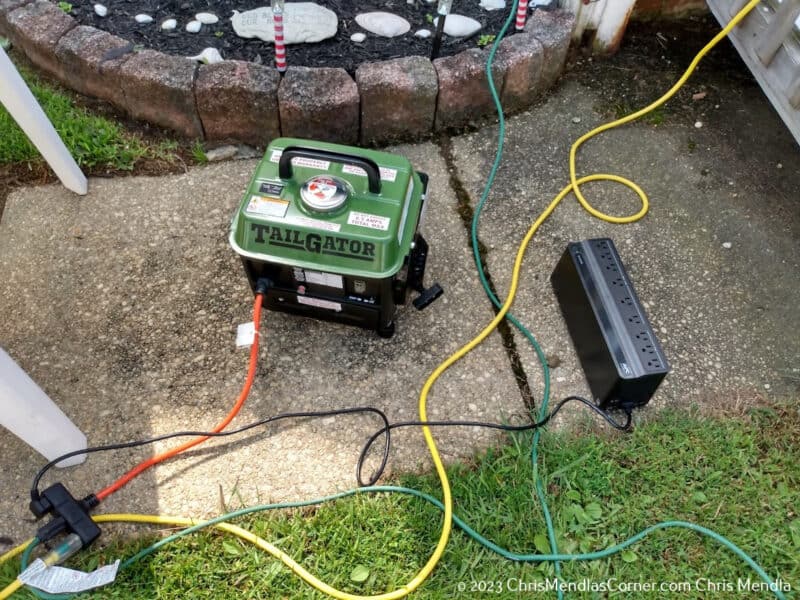A few years ago, there was a major power outage in my neighborhood. A neighbor’s child required a nebulizer. Shortly after the power failed, I heard his generator running. If the administration has it’s way that child would have been in mortal danger.
The proposal – Ban small gas powered generators
The Biden administration is proposing rules that would effectively ban small gasoline generators. In addition to leaving us in the dark, that will cause a number of life threatening situations. A generator, even a small gasoline powered generator is a crucial tool when preparing for emergencies or disasters.
Why Generators.
Small gasoline powered generators are valuable for short term power outages. They are invaluable for providing life sustaining power during major disasters such as the aftermath of hurricanes, tornados and large scale ice storms.
They range from about 800 watts that can power a small appliance to 10,000 watts which will power major appliances such as freezers and refrigerators. An 8000 watt generator can run about 24 hours on five gallons of gasoline. During a previous outage, a local gas station brought in a generator on a trailer to enable the pumps to operate.
Alternatives
There really isn’t a good alternative to the time tested gasoline powered generator.
- Solar power – The installation of solar panels is expensive. In the case of ice storms, they would be useless until the ice melts. When an area is impacted by severe storms, there is a likelihood that the solar panels would be damaged or destroyed.
- Battery backups – Seriously? A battery back up has a limited life. Once the charge is depleted, it is useless until charged again. A process that takes time and available electricity.
The elderly and disabled.
There was a storm that caused a 5 day power outage at my 90 year old mother’s home. She depends on a power recliner for sleeping. The backup in the recliner is 2 small 9 volt batteries. That is good for about 3 lifts. I had the foresight to hook up a battery backup. However, that was only good for about 10 lifts. When the battery backup died by the second day, my son fired up a ‘tailgater’ 800 watt generator. That allowed him to power the chair and recharge the battery backup. Under Biden’s plan she would have been stuck in her chair.
Many people depend on medical equipment ranging from CPAP machines to dialysis machines. A gas powered generator can literally be a life saver. As mentioned in the intro to this article, a neighbor’s young child was dependant on a nebulizer. Without the generator, that child would be at risk.
Disaster Recovery
Generators provide the power necessary for communities to recover from natural disasters. It can take a week or more to restore normal power. In extreme cases, that could be weeks.
- Generators Can Power Tools: Generators provide power for tools needed to remove debris or repair structures following a disaster. If you go to any of the major home stores, you will see that power tools such as chainsaws are largely battery powered. Imagine a scenario where you have fallen trees blocking emergency access to your neighborhood. The neighbors come out with battery powered chainsaws. An hour later you still have a lot of fallen trees but all the batteries have died.
- Rescue Operations: Generators provide power for equipment used in rescue operations, including Jaws of Life, floodlights and communication devices.
- Traffic Signals: They can power traffic signals during an outage to help avoid accidents from occurring. During a recent storm, traffic lights at key interesctions were kept operational by means of small (Less than 5kw) gas powered generators)
- Emergency Broadcasting Stations: They can power radio and TV stations that provide vital emergency updates during times of disaster.
- Disaster Relief Operations: Generators can power disaster relief operations such as mobile kitchens, temporary housing and command centers. Generators provide power for appliances used to prepare hot meals during times of distress.
Health issues
- Medical Equipment: Gas generators can power lifesaving medical equipment like ventilators, oxygen concentrators, CPAP machines, dialysis machines and refrigeration for critical medications.
- Emergency Medical Centers: Generators provide electricity to field hospitals or emergency medical centers to power lights, medical equipment and communication devices.
- Mobility assistance: Generators provide essential power to electric wheelchairs for people who rely on them, helping ensure their continued functionality and mobility. Many elderly and disabled persons depend on chairlifts.
- Lab Equipment: Generators provide essential backup for lab equipment that supports essential scientific work and medical research. This enables continuation of critical scientific work such as studies.
- Morgues and Funeral Homes: Morgues and funeral homes may provide cooling systems to preserve deceased bodies and help avoid potential health risks.
- Assisted Living Facilities: Generators provide critical power backup at assisted living facilities to ensure residents can access all necessary devices and services they require for daily living.
- Sewage Systems: They can power sewage systems, helping prevent public health hazards associated with waste buildup.
Safety of life
- Heating Systems: Generators can power heating systems during a winter power outage to avoid hypothermia. This is especially true with natural gas or oil heat as the wattage necessary is lower than what is required for a heat pump or resistance heat.
- Air Conditioning: When there is an extended power outage during summertime, generators are also capable of powering air conditioners to prevent heat-related illnesses from developing. Even if you don’t have enough capacity for an air conditioner, you can power fans throughout the house.
- Lighting: Generators provide light in areas where visibility is key, helping reduce injuries from falls or accidents by lighting pathways at night or other low light situations. This can reduce risks related to falls.
- Refrigeration: Generators can help ensure access to healthy and edible food by keeping fridges and freezers running, thus helping prevent food spoilage.
- Water Purification Systems: They can power water filtration or purification systems that provide safe drinking water sources. Many Suburban homes depend on well water. It the power goes out, there is a very limited reserve of water pressure.
- Generator-Powered Sump Pumps: Generators can power sump pumps that keep basements free from flooding, thus minimizing risks such as structural damage, electrical fires and drowning as well as the growth of dangerous mold.
- Generators Can Power Security Systems: Generators provide essential power for maintaining security systems and cameras to remain fully functional, maintaining safety and ensuring peace of mind for those using them.
Communication
- Communication: Generators provide power for devices that enable communication with the outside world, such as emergency services or gathering information about an incident.
- Recharging Devices: Generators can recharge essential devices like mobile phones, flashlights and radios that may prove crucial in an emergency situation.
- Telecommunication Systems: These can keep telecommunication systems functioning, keeping important lines of communication open.
- Maintain Internet Access: Generators provide critical internet access, providing communication and gathering of information across networks.
Other infrastructure
- Grocery Stores: Grocery stores can keep their freezers and refrigerators operating during an extended outage to maintain food supplies for their customers.
- Emergency Vehicle Charging Stations: Generators provide power for emergency vehicle charging stations to ensure continuous operations and provide constant power during emergencies. Keep in mind that states are trying to force electric vehicles on consumers. A reasonably priced portable gasoline generator can provide 220 volts for efficient charging of electric vehicles.
Summary and actions
A ban on small gas powered generators is reckless and life threatening. Contact your congressional ‘representatives’ and urge them to block this proposed regulation by unelected, unaccountable bureaucrats.
Watch the progress of this and consider purchasing an additional generator or two. There are procedures for laying up gasoline engines for long term storage.
Spread the word to your friends and family, especially those who would be most impacted. If you run into “Yes, I need my dialysis machine but this doesn’t apply to me because I don’t have a generator”, remind them that neighbors do have generators now. In a decade or so, this may no longer be the case.


